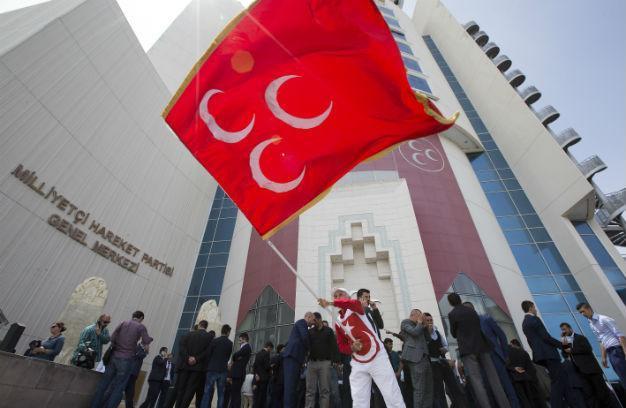MHP leader refutes ‘legal support’ from AKP against dissidents
Umut Erdem - ANKARA

AA photo
Turkey’s primary nationalist opposition party leader has categorically dismissed claims that his party has received “legal support” from the ruling Justice and Development Party (AKP) to halt efforts from party dissidents to effect change in the movement.“We have never been provided such assistance. I don’t assume that we will either,” Nationalist Movement Party (MHP) leader Devlet Bahçeli said May 14, a day before police sealed off a hotel in Ankara to prevent party dissidents from holding a congress that could unseat the leader.
Many believe that an MHP reinvigorated by new leadership could jeopardize President Recep Tayyip Erdoğan’s plans for more power.
A recent statement by Bahçeli, who said his party’s current de facto support for the government could turn into formal legal support “if necessitated by the anti-terrorism fight,” has been widely considered as “an open invitation” to forming a coalition government with the ruling AKP.
“It is not possible to figure out from today what kind of developments will take place. However, if there is a situation which would weaken the fight against terror, then we say that the MHP is ready to fulfill what falls on its shoulders as it would meet all demands from a legal aspect. It is not possible to know its shape today,” Bahçeli said when asked to comment on such an interpretation.
“Whoever wants can name this whatever he wants. A coalition is also a form of government. It happened in the past; 13 coalition government were formed in this country,” he said.
Under Bahçeli’s leadership and along with the now-dissolved Motherland Party (ANAP), the MHP was part of a three-party coalition government led by the Democratic Left Party (DSP) from May 1999 until November 2002 when the AKP came to power for the first time.
On May 16, the MHP headquarters filed a criminal complaint to the Ankara Chief Prosecutor’s Office, complaining of a three-member panel that was appointed by an Ankara court to organize the extraordinary congress and accepted the demands of the dissident MHP members.
The move prompted an appeal by the party headquarters.
The panel called the party delegates to “the pirate congress,” without waiting for the ruling on the MHP’s appeal, the lawyer said. He sought prosecution of the panel members under Article 217 of the Turkish Penal Code (TCK) which states, “Anyone who openly incites the population to disobey the laws shall be sentenced to imprisonment of from six months to two years or a judicial fine, where the incitement is sufficient to breach public peace.”
Meanwhile, the MHP headquarters dismissed the dissidents’ announcement in which they said they had collected signatures from 748 delegates when they circulated an attendance sheet on May 15.
Executives from the MHP said their account of delegates who signed the attendance sheet was 376. The party leadership is expected to launch an internal discipline process about former MHP lawmakers Meral Akşener, Sinan Oğan, Koray Aydın and Ümit Özdağ, who have voiced their intention to run for the party leadership, on charges of “humiliating the party before the public.”
In remarks published in daily Hürriyet on May 16, main opposition Republican People’s Party (CHP) leader Kemal Kılıçdaroğlu alleged “direct interference from the ruling party” in the situation.
“What should happen [regarding the MHP congress] is the legal realization of the process without political interference. But the outlook reveals that there is direct interference by the ruling party front. The emergence of such an atmosphere is troubling for everybody who is interested in politics, not only for MHP supporters,” Kılıçdaroğlu said.
















